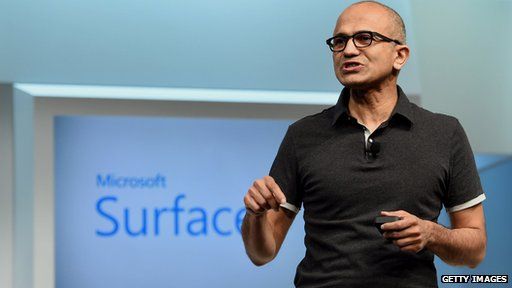Windows development set to be 'unified' by Microsoft
- Published

Microsoft has said work is under way to "unify" parts of its different Windows operating systems.
Chief executive Satya Nadella discussed the effort while briefing analysts following Tuesday's earnings update.
"We will streamline the next version of Windows from three operating systems into one single converged operating system for screens of all sizes," he said.
The firm also confirmed it had recently scrapped a new type of tablet.
"During the quarter, we reassessed our product roadmap and decided not to ship a new form factor that was under development," said Amy Hood, the company's chief financial officer.
Leaks had indicated that the firm had originally planned to launch the Surface Mini in May - a small tablet running the Windows RT system, a version of the OS designed for ARM-based chips.
Mr Nadella did not mention Windows RT during the conference call, instead referring to the three existing versions of Windows that would be merged as "one for phone, one for tablets and PCs, [and] one for Xbox".
However, as the tech news site Zdnet noted, that did not necessarily mean the firm was about to release a single variant of its operating system.
Rather, a single team is now working to deepen the links between Windows for PCs, Windows Phone and the Xbox OS, which are all based on the single Windows NT software core.
Universal apps
Mr Nadella said one target was for developers to be able to write a single app that would adapt its layout and controls to suit whether it was being used on a phone, tablet, PC or games console.
"One of beauties of universal Windows app is it aggregates for the first time for us all of our Windows volume," Mr Nadella said.
"An app that runs with a mouse and keyboard on the desktop can be in the store, and you can have the same app run in the touch-first [mobile devices].
"[It] gives developers the entire volume of Windows, which is 300 plus million units as opposed to just our 4% share of mobile in the US or 10% in some countries."
The move to "unify" the various Windows stores and developer platforms puts Microsoft at odds with Apple and Google, which are both pursuing separate strategies for app development on laptop/desktop computers and mobile devices - Apple with Mac OS X and iOS, Google with Chrome and Android.
But it does bring Microsoft closer to another OS developer, Canonical, which has promoted the idea of its Ubuntu system powering both phones and desktops. Canonical previously highlighted that one benefit of this strategy was that a handset could double up as a low-power desktop PC if it was plugged into a monitor and connected to a mouse.
It also paves the way for Microsoft to introduce its voice-controlled personal assistant, Cortana, to PCs. Mr Nadella mentioned the app several times during the call.
BBC's North America technology correspondent Richard Taylor meets Microsoft natural language guru Larry Heck
Microsoft has yet to discuss what new functions the successor to Windows 8 - codenamed Threshold - will offer, but one expert suggested the firm would at least find it easier to sell a more joined-up set of operating systems.
"Microsoft has had a real problem trying to educate the market about the differences between the different platforms its been running," said Chris Green, principal technology analyst at the Davies Murphy Group consultancy.
"So, given the issues it's had on that front, going down the one-size-fits-all approach is something it sees as much easier for the user base to comprehend."
- Published22 July 2014
- Published17 July 2014
- Published17 July 2014
- Published22 August 2013